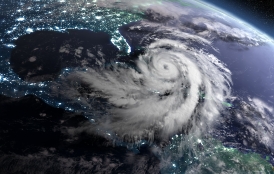The Stanford School of Earth, Energy & Environmental Sciences is now part of the Stanford Doerr School of Sustainability.
This page is currently being maintained for archival purposes only. For the latest information, please visit us here.
Perspective: Let's stop talking about climate change
Instead of talking about the polarized topic of climate change, Stanford Earth scientist Rob Jackson suggests focusing on the shared benefits of addressing the problem, including job creation, health and safety.
By
Rob Jordan
For a leading scientist, Rob Jackson has what may seem a strange remedy for the deeply polarized national debate on climate change: look past the science.
Rather than focus on evidence of global warming’s harmful impacts, Americans would do better to explore how action on the issue can improve areas of shared values, such as job creation, health and safety, according to Jackson, the Michelle and Kevin Douglas Provostial Professor at Stanford’s School of Earth, Energy & Environmental Sciences. He recently published his unusual argument in Scientific American.
Jackson recently discussed how and why the shift makes sense. He also delivered a related lecture at Stanford in January.
Can you give an example of what you mean by turning the climate conversation away from science?
We need to relate to people’s daily lives. People care more about improving human health than reducing greenhouse gas emissions. If I say coal use in the United States dropped by 20 percent in the last two years, slashing carbon dioxide emissions and future climate change, many people would yawn. If I say the same drop in coal use will save 3,000 American lives this year by reducing air pollution, people notice. Both things are true.
Is there an example from your own work of how framing the climate conversation around more relatable issues has led to action?
When you walk down a street and smell a natural gas leak, you are thinking about safety, not climate. Our mapping of street leaks showed cities that replaced all of their century-old cast-iron and unprotected steel pipes had a tenth the leaks of other cities. Based in part on our work, Massachusetts passed an accelerated pipeline replacement program a few years ago. Costing households only a dollar a month, it will reduce leaks and greenhouse gas emissions and make the system safer from the risks of fire and explosion.
What are some pending environmental decisions in which the conversation fails to account properly for the kinds of shared values you describe?
The administration’s threat to cut fuel efficiency standards for cars and trucks is a great example because – although it is often discussed in terms of climate change – it also impacts finance, health and security. Consumer Reports estimates people will save about $4,500 over the life of their car once the standards are fully implemented. Half of Americans live in towns and cities that don’t meet air quality standards, caused in part by ozone and particulate pollution from cars and trucks. We’re still importing 3 millions barrels of oil a day from OPEC countries.
Another example is the threat to the “Clean Waters Rule,” which protects smaller streams and rivers from toxic pollution. It’s important because, just like our blood vessels, smaller streams connect to larger ones. Who would say we don’t need to worry about a toxin that enters the capillaries in our fingertips? Farmers and businesses have legitimate concerns about the rule, but its benefits for clean drinking water are clear.
In a bifurcated news world, people form stereotypes about issues depending on where they get their news. How do we sidestep those pre-existing stereotypes when talking about climate issues?
We can cut through stereotypes by discussing what people value. Jobs are a good example. In the electricity sector, there are 475,000 people working in the solar and wind industries, three times more than in coal and natural gas combined. Solar and wind power created an astonishing 100,000 new jobs last year. We’re gaining green jobs much faster than we’re losing jobs in the coal sector.
More than 2 million Americans work in fields related to energy efficiency, a sector that created 133,000 jobs last year. Green energy and technologies don’t just help our climate. They put people to work. That’s a story that crosses news worlds.
How did we get to the current political climate in which addressing climate change is seen by many people as unimportant or even burdensome?
Money has poured in to discredit the benefits of environmental progress. Part of the blame goes to lobbyists and to industry. Scientists share some blame, too, though. When we document the effects of environmental harm (or progress), we forget that reporting a change doesn’t necessarily prompt society to act on it. Scientists need to learn to talk about their discoveries in ways that resonate with what people care about and help society know how to take action. Other priorities may soak up the limited funds available for society to fix the problem.
Despite the challenges you describe in communicating about climate change and advocating for action, is there any good news to report?
There is. Carbon dioxide emissions in the United States have been dropping slowly but steadily for a decade because of greater energy efficiency and a switch from coal power to natural gas, wind and solar.
Globally, we’re seeing the start of something new: a decoupling of economic growth from fossil fuels. Previously the only time we’d seen carbon dioxide emissions stabilize or fall was when the global economy shrank, such as during the financial crisis of 2008 or the breakup of the Soviet Union. Based on our research at the Global Carbon Project, carbon dioxide emissions have been flat for the past three years while the global economy is still growing. We’re starting to decarbonize the global economy.
Jackson is chair of the Stanford Department of Earth System Science and a senior fellow with the Stanford Woods Institute for the Environment and the Precourt Institute for Energy. He also chairs the Global Carbon Project.







